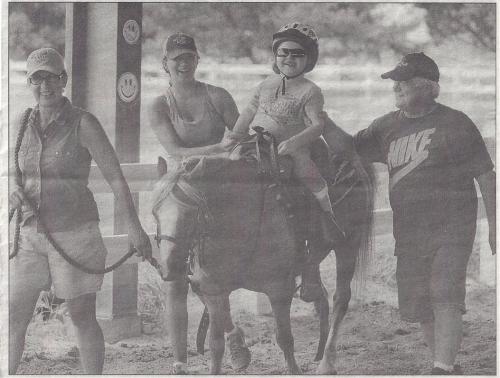See You S.M.I.L.E.
FIVE-YEAR-OLD Abriella Cochran of Humphrey smiles during a riding lesson recently at S.M.I.L.E. near Madison. She's assisted by the program's owner, Patty Prauner, and workers Nicole Jackson and Gene Galyen.By MARCELLA MERCER MADISON – Every Tuesday, 5-year-old Abriella Cochran gets ready for something special. The young girl has Rett syndrome, which is neurological disorder that makes it difficult for her to do everything from speak to eat. But on Tuesdays, she often giggles and grins, waiting for the moment she and her father, Julian Cochran, pull away from their home in Humphrey and head for her therapy session. Their destination lies out in the country, northwest of Madison, and could almost be missed if not for the sign at the turn-off detailed with a big, yellow smiley face. The minute Julian Cochran parks his van in front of the tack shed, workers come out to greet him and take over getting Abriella ready. Butterfly-patterned braces get strapped onto her shins. A pink helmet is fastened on, matching her My Little Pony T-shirt. Employees lift her out of her wheelchair and support her so she can stand. Soon, it's one-two-three and she's hoisted onto the pony, Cookie. This therapist has no advanced degrees. She can't even talk. And yet, according to Julian Cochran, seeing Cookie - along with the workers who help Abriella ride her - has helped his daughter progress more than anything else has. FOR 25 YEARS, S.M.I.L.E. (Stephanie's Miracles in Loving Equine) has provided riding lessons for clients with a spectrum of conditions. Patty Prauner, S.M.I.L.E.'s owner is particular about what she calls the organization's service. "We call it a riding lesson because these kids hear therapy and work and exercise all the time," she said. "So they're here to get a riding lesson and learn to ride a horse to the best of their ability and have fun doing it." From blindness to autism, riders' conditions vary in severity and scope. Most riders have some form of a disability, but others come to improve their self-esteem or learn more about horses. There are seven steps to a session, which include tasks from brushing to placing the saddle. Riders complete the step as best as they're able, allowing them to develop things like their fine motor skills, speech and self-discipline. Riding itself develops muscle tone and social skills as the rider interacts with the horse and the S.M.I.L.E. workers who guide them. Many riders slowly circle the arena on their horses, accompanied by S.M.I.L.E. workers at their sides. More advanced riders can ride solo at quicker pace, fetching rings from trees or teaching the horse to obey their commands. TODAY, S.M.I.L.E. serves around 135 riders every week with 15 horses. But when Prauner first began in 1992, she started with a single rider, the program's namesake, Stephanie Preusker of Battle Creek. As an infant, Preusker suffered complications from spinal meningitis at caused her difficulty walking or moving easy. Prauner and Stephanie's mother, Barb Preusker, thought the then-5-year-old girl might benefit from riding a pony. Once Prauner saw the lessons helped Stephanie, improving her posture and promoting muscle tone, she continued on from there, taking on more riders and horses to keep up with demand. But it's expensive to take e of horses, especially ones that undergo the wear and tear of several riders a day. Around 2000, Prauner almost shut the business down because of costs. "I took risks," she said. "But like I told my husband, 'What's riskier, farming or this?' We've taken risks our whole lives, and then things just fell into place." The upswing began once she moved S.M.I.L.E. across the road to its current five-acre location. After that, she gradually enlisted family and other help to add the tack shed, covered riding arena and fences, so the program was capable of serving more students. The work of local groups and the contributions of donors remain essential in keeping the place running and costs low for riders. VOLUNTEERS and employees with a passion for S.M.I.L.E.'s work are also necessary to the organization, Prauner said. Most of the workers have been spending their summers there for several years, be- coming close friends, and sometimes, using their experience at S.M.I.L.E. to pave the way to careers in teaching, family sciences and health fields. Nicole Jackson of Madison has worked at S.M.I.L.E for six years, first as a volunteer and then as a full-time employee. The 19-year-old studies special education at Wayne State College, which allows her to view riders with a different perspective. "I love a challenge," she said. "I've had parents tell me, 'Oh, my gosh, I'm so sorry he's acting this way,' and I'm like, 'Don't be. I'm learning from this. I'm watching him grow and I'm growing at the same time.' " April Osborn's goal is to open her own riding program like S.M.I.L.E one day. "I cannot wait to come here every day," she said. "Even though the children get frustrated sometimes, to see them accomplish a small task, such as they get a horse to turn that did not want to listen, then they have so much confidence going forward. It's unreal how rewarding that is." With as long as S.M.I.L.E. has been operating, some of the horses are decades old. AT FIRST, PRAUNER ANOTHER NOTICEABLE difference is in the confidence many of the riders develop over their sessions. Twenty-year-old- Maria Broekemeier of Norfolk has been coming to S.M.I.L.E. for five years. Horses are one of her favorite animals, but it wasn't always that way. "The first time I came out here, I was actually afraid," she said. "I'd never been around big animals before, and as I came out more and more I got used to them." Now, Broekemeier is one of around 24 S.M.I.L.E. riders who participate in equestrian events at the Nebraska Special Olympics in Grand Island. "It's important for them because a lot of them don't get to compete in sports," Prauner said. But a lot of the time, the results of S.M.I.L.E. are more subtle. One of the most devastating aspects of Rett's syndrome is that it often doesn't appear until a child is a few months to a few years old. With Abriella, her parent's noticed regression at about 9 months old, and her ability to walk, speak and use her hands well slipped away by the time she was 2. But when Abriella's session is over, and the workers pop her off Cookie, they generally have good news for dad. They still have to hold her lightly so she sits upright, but her core strength is bet- ter. She's started talking again, too, and although she doesn't speak every ride, her giggles ring out as the workers help her back into her chair. JULIAN COCHRAN said- coming to S.M.I.L.E regularly this summer has made things easier at home, too. Playing with her 9-month-old brother Kyson on the floor is less of a struggle now that Abriella can sit upright. Most importantly though, she's just happier. "I love coming out here," he said. "Knowing how happy she is and how well she's taken care of, how she's progressing, it brings you to tears almost. I think it did a couple times." Sometimes, Prauner suggests the results of S.M.I.L.E. come from simple causes. She told Julian Cochran if he had a nice, little pony in front of him, he'd be inspired and cheerful, too. But after 25 years of the program, Prauner makes a point of acknowledging that she's seen incredible things. "Miracles happen here," she said. |
Posted on: Tuesday, March 28, 2017
Last modified on: Monday, April 3, 2017



